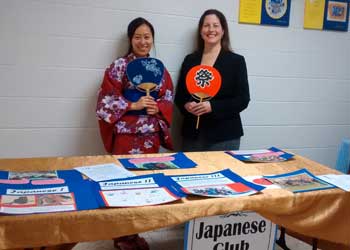

 2014 J-LEAP Report
2014 J-LEAP Report
Downingtown East High School
Downingtown, PA
Hello. My name is Yoko Nishikawa and I’m currently working as a Japanese assistant teacher in Downingtown Area School District, which is located in Chester County, Pennsylvania.
Pennsylvania is located in the Northeastern part of the United States and is also known as the Mid-Atlantic States. It is bordered by New York, West Virginia, Delaware, Ohio, New Jersey and Maryland as well as Lake Erie and Ontario, Canada to the northwest. I thought it’s a very big state because it takes more than 5 hours to drive across it by car. Pennsylvania is actually the 33rd largest state in the country, which made me realize that America is really big! Land wise, Pennsylvania is not a big state (though it is big for Japanese people), but it has a large population being 6th in the country with a high populated density. This fact surprised me because all the houses here are big with huge yards, and there are not many tall buildings over two-stories around Downingtown or Chester Springs, the place where I live now. You may know the names of major cities in this state like Philadelphia or Pittsburgh, but Downingtown is not familiar to most people. It’s a small town and has a lot of nature. We see rabbits, squirrels, foxes, dear and other wildlife every day. Sometimes they eat nuts and berries adorably in the backyard, and other times they shoot out of the woods and jump in front of your car startling you. There are also many farms in this area with horses, cows, goats and alpacas.
I’m teaching with Mrs. Buglio at two high schools and one university including Downingtown East High School, Downingtown West High School and Widener University.
Downingtown East High School was ranked 167 in the nation out of over 26,000 public high schools for 2014. Downingtown West High School was named to Newsweek’s list of top schools in the United States for 2013 and 2014. Students at both high schools study very hard.
We teach three levels of Japanese including Japanese 1 and 2 at the high schools and Japanese 3 at the university. High school students who finish Japanese 1 & 2 can take Japanese 3 at the university and receive college credits.
This year we teach Japanese 1 & 2 as a combined class, which is an unwelcome situation for the students. Mrs. Buglio teaches the Japanese 2 students and I’m teaching the Japanese 1 students in the same classroom, but sometimes we do some activities together.
Japanese 1 students learned how to write their names in Katakana and introduce themselves in Japanese. I also taught them Japanese etiquette when they introduce themselves. They were surprised during the first lesson when I spoke entirely in Japanese with gestures, but they are now getting used to listening in Japanese.
Almost three months have passed since I came here and I’m still in the middle of finding out what our students are interested in, what I can do to increase their interests in Japan, how I can motivate them to learning Japanese, and ways I can improve co-teaching with Mrs. Buglio.
It is hard to work without family and friends here where the culture and language is also different from my own. Every single thing here is a challenge for me, but I’m happy to try because this is such a great opportunity for me. I’m extremely grateful to be here and I appreciate everyone who has been nice to me and helped me out while I adjust to my new life.
And above all, when I see that my students are smiling and enjoying the class, it makes me forget about all my problems.
I will do my best to make my students smile more often and make them and any other people here feel closer to Japan.